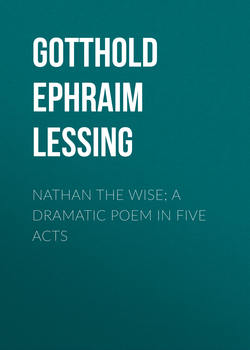Читать книгу Nathan the Wise; a dramatic poem in five acts - Г. Э. Лессинг, Gotthold Ephraim Lessing - Страница 6
ACT II
ОглавлениеScene.—The Sultan’s Palace.—An outer room of Sittah’s apartment
Saladin and Sittah, playing chess
SITTAH
Wherefore so absent, brother? How you play!
SALADIN
Not well? I thought—
SITTAH
Yes; very well for me,
Take back that move.
SALADIN
Why?
SITTAH
Don’t you see the knight
Becomes exposed?
SALADIN
’Tis true: then so.
SITTAH
And so
I take the pawn.
SALADIN
That’s true again. Then, check!
SITTAH
That cannot help you. When my king is castled
All will be safe.
SALADIN
But out of my dilemma
’Tis not so easy to escape unhurt.
Well, you must have the knight.
SITTAH
I will not have him,
I pass him by.
SALADIN
In that, there’s no forbearance:
The place is better than the piece.
SITTAH
Maybe.
SALADIN
Beware you reckon not without your host:
This stroke you did not think of.
SITTAH
No, indeed;
I did not think you tired of your queen.
SALADIN
My queen?
SITTAH
Well, well! I find that I to-day
Shall earn a thousand dinars to an asper.
SALADIN
How so, my sister?
SITTAH
Play the ignorant—
As if it were not purposely thou losest.
I find not my account in ’t; for, besides
That such a game yields very little pastime,
When have I not, by losing, won with thee?
When hast thou not, by way of comfort to me
For my lost game, presented twice the stake?
SALADIN
So that it may have been on purpose, sister,
That thou hast lost at times.
SITTAH
At least, my brother’s
Great liberality may be one cause
Why I improve no faster.
SALADIN
We forget
The game before us: lot us make an end of it.
SITTAH
I move—so—now then—check! and check again!
SALADIN
This countercheck I wasn’t aware of, Sittah;
My queen must fall the sacrifice.
SITTAH
Let’s see—
Could it be helped?
SALADIN
No, no, take off the queen!
That is a piece which never thrives with me.
SITTAH
Only that piece?
SALADIN
Off with it! I shan’t miss it.
Thus I guard all again.
SITTAH
How civilly
We should behave to queens, my brother’s lessons
Have taught me but too well.
SALADIN
Take her, or not,
I stir the piece no more.
SITTAH
Why should I take her?
Check!
SALADIN
Go on.
SITTAH
Check!—
SALADIN
And check-mate?
SITTAH
Hold! not yet.
You may advance the knight, and ward the danger,
Or as you will—it is all one.
SALADIN
It is so.
You are the winner, and Al-Hafi pays.
Let him be called. Sittah, you was not wrong;
I seem to recollect I was unmindful—
A little absent. One isn’t always willing
To dwell upon some shapeless bits of wood
Coupled with no idea. Yet the Imam,
When I play with him, bends with such abstraction—
The loser seeks excuses. Sittah, ’twas not
The shapeless men, and the unmeaning squares,
That made me heedless—your dexterity,
Your calm sharp eye.
SITTAH
And what of that, good brother,
Is that to be th’ excuse for your defeat?
Enough—you played more absently than I.
SALADIN
Than you! What dwells upon your mind, my Sittah?
Not your own cares, I doubt—
SITTAH
O Saladin,
When shall we play again so constantly?
SALADIN
An interruption will but whet our zeal.
You think of the campaign. Well, let it come.
It was not I who first unsheathed the sword.
I would have willingly prolonged the truce,
And willingly have knit a closer bond,
A lasting one—have given to my Sittah
A husband worthy of her, Richard’s brother.
SITTAH
You love to talk of Richard.
SALADIN
Richard’s sister
Might then have been allotted to our Melek.
O what a house that would have formed—the first—
The best—and what is more—of earth the happiest!
You know I am not loth to praise myself;
Why should I?—Of my friends am I not worthy?
O we had then led lives!
SITTAH
A pretty dream.
It makes me smile. You do not know the Christians.
You will not know them. ’Tis this people’s pride
Not to be men, but to be Christians. Even
What of humane their Founder felt, and taught,
And left to savour their found superstition,
They value not because it is humane,
Lovely, and good for man; they only prize it
Because ’twas Christ who taught it, Christ who did it.
’Tis well for them He was so good a man:
Well that they take His goodness all for granted,
And in His virtues put their trust. His virtues—
’Tis not His virtues, but His name alone
They wish to thrust upon us—’Tis His name
Which they desire should overspread the world,
Should swallow up the name of all good men,
And put the best to shame. ’Tis His mere name
They care for—
SALADIN
Else, my Sittah, as thou sayst,
They would not have required that thou, and Melek,
Should be called Christians, ere you might be suffered
To feel for Christians conjugal affection.
SITTAH
As if from Christians only, and as Christians,
That love could be expected which our Maker
In man and woman for each other planted.
SALADIN
The Christians do believe such idle notions,
They well might fancy this: and yet thou errest.
The templars, not the Christians, are in fault.
’Tis not as Christians, but as templars, that
They thwart my purpose. They alone prevent it.
They will on no account evacuate Acca,
Which was to be the dower of Richard’s sister,
